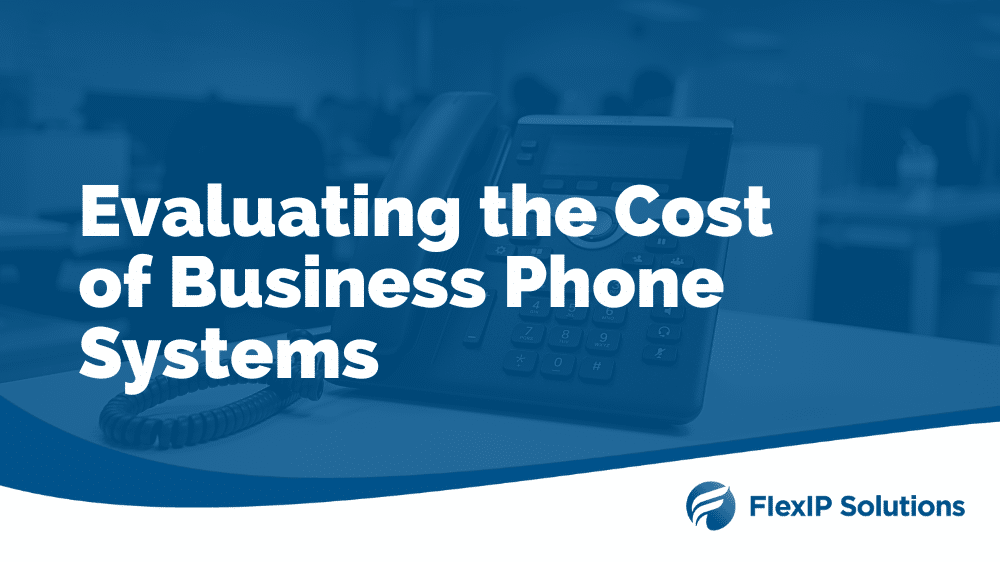Enterprises and SMBs need to take stock of their current hosted VoIP phone service to ensure they’re getting the best return on investment (ROI) possible on their business VoIP phone services.
What Factors Contribute to the Pricing of a Business Phone System?
Several key factors contribute to the price of a business phone system, including the number of users at an organization, the feature set of each seat, and the type of office phone system deployed.
Number of Users
Typically, hosted VoIP business solutions are priced by the number of users (often referred to as “seats”) that a business has using the hosted VoIP services. Modern cloud-based business phone systems offer fixed pricing for each seat so that organizations can only purchase services they use and need. If a business has six employees, it can purchase six seats precisely without buying a package of ten seats, for instance.
Legacy-tiered pricing models for on-premises phone systems are often structured with thresholds based on the number of users but may not fit the exact number of users utilizing the phone system. For example, a legacy on-premises business phone system provider may sell small business phone system packages of one to five seats for micro-SMBs and packages of five to ten as a step-up for slightly larger micro-SMBs – for those same six employees to all get a phone system, the small business would need to purchase ten seats, with four of them being unused until the organization expands headcount.
Features
The features enabled on business phone services can impact the price depending on the hosted VoIP provider delivering the hosted business VoIP service.
Standard features of a VoIP business solution include the following:
- Direct Inward Dialing
- Automated Directory
- Voice Mail & Unified Messaging
- Call Forwarding
- Call Routing
- Disaster Routing
- Emergency Call Notification
- Call Transfer
- Call Hold
- Call Logs
- Automatic Callback
- Speed Dial
- Call Paging & Intercom Functionality
- Multiline Hunt Groups
- Find Me/Follow Me
Add-on features of a hosted business VoIP solution include the following:
- Automatic Call Distribution (ACD)
- Team, Web & Video Collaboration
- Call Recording
- Faxing Solutions
- Toll-Free Service
- SMS-enablement
The more add-on features applied to each seat or company account, the higher the phone system cost will be.
Type of Office Phone
Each office phone and its model contribute to the overall cost of the phone system. There are several types available, including:
- Hard Phones
- Softphones
- Wireless IP Phones
- USB Phones
- Desktop VoIP Phones
- Videophones
- Conference Phones
Hard Phones
Hard phones are kept on desks or in meeting rooms and are typically used for conference calls, accessing voicemail and direct calls.
Softphones
Softphones are virtual phones that operate in a unified communications application on an Internet-enabled device such as a computer, laptop, tablet or smartphone. A softphone is a software installed on each user’s device that allows them to make and receive phone calls. These are ideal for mobile and remote workers since they don’t require a traditional phone handset to be hooked up.
Wireless IP Phones
A wireless IP phone is an IP phone that has an integrated WiFi or DECT transceiver device for connection to a network access point which allows users to move around their place of business while on the phone without being tied directly to a device or wired IP phone.
USB Phones
USB phones connect to computers through USB ports and are combined with a softphone program.
Desktop VoIP Phones
Desktop VoIP phones connect to your VoIP phone system or service provider through an Ethernet connection and have all the standard phone functions most businesses expect.
Videophones
A videophone is an IP phone that can capture video through a camera connected to the handset.
Conference Phones
IP conference phones are used in large offices and conference rooms for multi-party voice-based conversations.
Each phone has its own cost and can be rented or bought from a business phone system service provider.
What’s the Cost by Type of Business Phone System?
Costs vary based on the type of business phone system your organization is deploying. Companies primarily use hosted VoIP, unified communications, contact centers and SIP trunking solutions.
Hosted VoIP
Different hosted VoIP phone systems meet different needs, depending on whether the platforms are small business phone solutions or enterprise VoIP phone systems. The best VoIP phone system is customized to meet each organization’s needs, which factors into the price.
For example, with enterprise VoIP solutions, each department has varying levels of feature-functionality requirements, with customer service or technical support needing the most feature-rich seats and marketing or internal-facing only departments needing seats with the lowest levels of functionality.
VoIP-hosted services are typically billed in a monthly-recurring model as part of industry-standard one-year, two-year and three-year annual contracts.
Note that a vital price variable to consider with hosted VoIP phone systems is the Internet connection servicing your office locations and employees’ remote home offices. VoIP and video calling have bandwidth requirements that must be met. Most VoIP service providers will inform you of these requirements since they’re necessary for the phone system to function correctly.
According to expertmarket.com, hosted VoIP phone system pricing generally breaks down like this:
- Low-end hosted VoIP phone systems cost $10 to $25 per user per month
- Mid-range hosted VoIP phone systems cost $25 to $40 per user per month
- High-end, enterprise-level phone systems cost $40 to $140 per user per month
- Basic desk phones start at $50 each, with more advanced models running as high as $416 each
Volume-based and contract-length discounts vary based on the phone system provider but are usually available to most business customers.
Unified Communications
UCaaS services, just like hosted VoIP, are billed as a monthly-recurring fee, with various factors impacting the bottom-line cost, including:
- Licensing agreements
- Calling plans
- Devices for calling
- The amount of implementation assistance required
- Ongoing maintenance, support and service
- Migration into the cloud and integration with existing services
- The cost of replacing any on-premises devices
- Training and provisioning for new employees
Generally, you can expect to pay between $16 and $65 per user per month.
Contact Center
Contact center services are also priced by the seat on a monthly-recurring basis and have a range of feature functionality impacting the price, including:
- Email communication
- Live chat
- Outbound calling
- ACD
- IVR
- Call recording and monitoring
- Call queuing and callback
- CRM integration
- Real-time analytics and reporting
- Skills-based routing
- Workflow automation
While contact center seat prices vary widely, they’re generally available between $15 per user per month to $230 per user per month, depending on the feature functionality customized on each seat.
SIP Trunking
SIP trunking services are the step between your on-premises phone and modern cloud-based phone systems. Through SIP trunking, you can add new IP capabilities and extend the life of your on-premises phone system by connecting it to the Internet and enabling VoIP calling.
A few key factors impact the cost of SIP trunking, including:
- Monthly subscription – priced per channel of voice service
- Outbound call rates – metered plans will charge you per minute
- Add-ons – optional features might cost extra, such as call recording or an auto attendant
- Setup fees – one-time activation or setup fees to begin SIP trunk service
There are usually two approaches to the cost of SIP trunking:
- Metered plans which include a monthly fee and per-minute charges for outbound calls
- Unmetered plans, which include a monthly fee and unlimited calling for a fixed price
SIP trunking pricing varies based on each provider, but plans start at around $15 per line per month for metered plans and $25 per line per month for unmetered plans.
Take Your Business Phone System to the Next Level with FlexIP Solutions
FlexIP Solutions delivers managed cloud communications services customized for businesses of all sizes and optimized for the best value and performance. We were founded on the best practices of consultative solutions engineering; white-glove service implementation; ongoing monitoring, management and reporting; and on-demand customer service from real people.
Our Perfect-Fit Promise takes a holistic view of your company’s needs and objectives and delivers a white-glove, fully managed communications solution that:
- Lowers your costs by providing only what you need when you need it
- Offers the most advanced features and customization in the market
- Scales affordably and reliably
- Enables fast and efficient multilocation and remote workforce management
- Offloads setup, initial training and ongoing training to our team
- Provides you with a single point of contact for fast resolution of any issues. We even interface with your Internet service provider to resolve the problem – no finger-pointing.
Don’t take our word for it; you can see how we helped longtime customer Advanced Enviro Systems avert communications disasters three times – check out this success story here.
Ready for a next-generation cloud business phone system? Check your service availability on our pricing plans page. Call or text FlexIP Solutions at 888.905.6311.


